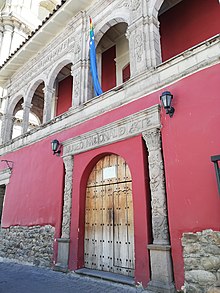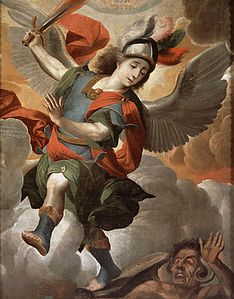| This article needs additional citations for verification. Please help improve this article by adding citations to reliable sources. Unsourced material may be challenged and removed. Find sources: "National Museum of Art, La Paz" – news · newspapers · books · scholar · JSTOR (March 2021) (Learn how and when to remove this message) |
 | |
| Established | 1964; 61 years ago (1964) |
|---|---|
| Location | La Paz, Bolivia |
| Coordinates | 16°29′45″S 68°08′04″W / 16.49585°S 68.13433°W / -16.49585; -68.13433 |
The National Museum of Art, Palacio Diez de Medina is a museum in the city of La Paz, Bolivia. It has an important permanent collection of colonial paintings, including canvases by Melchor Pérez de Holguín, a painter 16th century and those of Gregorio Gamarra, a 17th-century painter.

Location
The museum is located right in front of the main square of the city of La Paz, Plaza Murillo, specifically at the intersection of the pedestrian promenade Calle Comercio and Calle Socabaya.
History
This building was the residence of the then Mayor Don Francisco Tadeo Diez de Medina y Vidango. Later it became the property of the Counts of Arana, subsequently during the La Paz revolution it became the property of the Marquises of Villaverde. At the end of the 19th century they functioned as the famous Gisbert hotel. In the year 1964, the palace was adapted to house the National Museum of Art of Bolivia, preserving its two courtyards and three levels. The main entrance is located on Socabaya Street.
Architecture
The entrance shows a stone façade carved and decorated with baroque motifs that spanned the three levels of the building. At the meeting of Socabaya and Comercio streets, the corner stone column and the stone balcony stand out.
Collections
Colonial and republican art
Some of the key painting in the collection include the following:
- Virgin of Fuencisla, 1723
- Virgin of the Hill, 1720
- Coronation of the Virgin by the Trinity and the Saints, 18th century
- Child Jesus with symbols of the Passion, Gregorio Gamarra
- Coronation of the Virgin, Gaspar Miguel de Berrío.
Contemporary art
The museum also has Bolivian, Latin American and international contemporary art in its collections such as those of Spanish artist Javier de Villota.
Selected works
-
 Anonymous. Virgin of Pomata, 1680
Anonymous. Virgin of Pomata, 1680
-
 Gaspar Miguel de Berrío. Coronation of the Virgin, 18th century.
Gaspar Miguel de Berrío. Coronation of the Virgin, 18th century.
-
 Anonymous. Virgin crowned by the Trinity and saints, 18th century.
Anonymous. Virgin crowned by the Trinity and saints, 18th century.
-
 Anonymous. Saint Michael the Archangel, 1708.
Anonymous. Saint Michael the Archangel, 1708.
-
 Anonymous. Virgin of the Cerro of Potosí, 1720.
Anonymous. Virgin of the Cerro of Potosí, 1720.
-
 Leonardo Flores. Adoration of the shepherds, 17th century.
Leonardo Flores. Adoration of the shepherds, 17th century.
-
 Anônimo. Anjo-Virtude, Baraquiel, século XVII.
Anônimo. Anjo-Virtude, Baraquiel, século XVII.
-
 Anonymous. Portrait of Philip V as Santiago, 18th century.
Anonymous. Portrait of Philip V as Santiago, 18th century.
See also
References
- "Historia del Museo". Museo Nacional de Arte. Archived from the original on 23 February 2009. Retrieved 10 June 2010.
- "Javier de Villota en el CCE Santiago de Chile | ::Hipermedula.org". hipermedula.org (in European Spanish). Retrieved 12 March 2018.
- "Arte y violencia política - La Razón". www.la-razon.com. Archived from the original on 12 March 2018. Retrieved 12 March 2018.
- Matthew Restall, Kris Lane (2018). Latin America in Colonial Times. Cambridge University Press. p. 287. ISBN 978-1108416405.